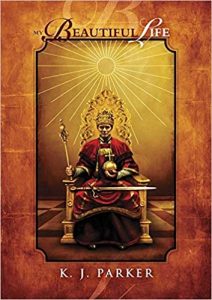Gary K. Wolfe Reviews My Beautiful Life by K.J. Parker
 My Beautiful Life, K.J. Parker (Subterranean 978-1-59606-930-5, $40.00, 112pp, hc) November 2019.
My Beautiful Life, K.J. Parker (Subterranean 978-1-59606-930-5, $40.00, 112pp, hc) November 2019.
Unlike the long tradition of disruptive but fundamentally decent rogues, K.J. Parker’s invidious protagonists, who are often his narrators, can almost seem ingratiating in their forthrightness and cynicism – until we catch on to what sort of ruthlessness they are really capable of. It’s not giving anything away to point out that Parker’s new novella My Beautiful Life begins with the admission, “I’ve done some truly appalling things in my life” and ends with the words “It’s been a beautiful life, one way and another.” The convoluted moral algebra that permits the unnamed narrator to blithely hold both thoughts in mind at once is also a key to what guides him from utter poverty and homelessness to immense political power and influence, leaving a trail of betrayals, murders, and mutilations along the way.
The setting is Parker’s usual vaguely European Empire, with the Studium and its near-universal worship of – or at least lip-service to – the Invincible Sun. The conceit is that the illiterate narrator is dictating his memoir to a servant – which accounts for lots of the acerbic digressions that Parker narrators are known for – describing how he and his two brothers were raised by their prostitute mother in a hut in a remote mountain village, until their poverty grew so great that one of the boys had to be sold. The eldest son Nico volunteers, but, after learning that eunuchs fetch the best prices, he mutilates himself horribly and nearly dies. After he is sold and the mother dies, the two remaining brothers turn to thievery for several years, until, in a Dumas-like surprise, they are rescued by Nico. After being sold to a bureaucrat and trained as a clerk, Nico had manipulated and blackmailed his way up the civil service ladder, eventually wangling his way into a powerful position as Count of the Stables. As shrewd as Nico has been, bringing his brothers into the intrigues of the court turns out to be a bad idea for him, since the narrator, aided by his disarming good looks, turns out to be even more ruthless and cunning.
The rest of the story details the narrator’s rise to power, aided by the fact that the Emperor himself is “a pin-headed idiot who thinks he’s great and strong and wise” – which is a problem, since unlike most emperors, he meddles in the civil service bureaucracy that actually runs things. It’s not long before strategic marriages, alliances, double-crosses, and genuine skill at economic and military strategy elevate the narrator to the position of power from which he, now older and dying, is dictating this story. A good part of what complicates the narrator’s character is that, for all his chilling machinations, he implements some humane and progressive ideas, such as a public works program that vastly reduces unemployment. Part Horatio Alger story as conceived by Machiavelli, part political and social parable – replete with Parker’s customary skill at describing in impressive detail how to run an empire at ground level – My Beautiful Life is as darkly funny and cheerfully appalling as we’ve come to expect from Parker.
Gary K. Wolfe is Emeritus Professor of Humanities at Roosevelt University and a reviewer for Locus magazine since 1991. His reviews have been collected in Soundings (BSFA Award 2006; Hugo nominee), Bearings (Hugo nominee 2011), and Sightings (2011), and his Evaporating Genres: Essays on Fantastic Literature (Wesleyan) received the Locus Award in 2012. Earlier books include The Known and the Unknown: The Iconography of Science Fiction (Eaton Award, 1981), Harlan Ellison: The Edge of Forever (with Ellen Weil, 2002), and David Lindsay (1982). For the Library of America, he edited American Science Fiction: Nine Classic Novels of the 1950s in 2012, with a similar set for the 1960s forthcoming. He has received the Pilgrim Award from the Science Fiction Research Association, the Distinguished Scholarship Award from the International Association for the Fantastic in the Arts, and a Special World Fantasy Award for criticism. His 24-lecture series How Great Science Fiction Works appeared from The Great Courses in 2016. He has received six Hugo nominations, two for his reviews collections and four for The Coode Street Podcast, which he has co-hosted with Jonathan Strahan for more than 300 episodes. He lives in Chicago.
This review and more like it in the November 2019 issue of Locus.
 While you are here, please take a moment to support Locus with a one-time or recurring donation. We rely on reader donations to keep the magazine and site going, and would like to keep the site paywall free, but WE NEED YOUR FINANCIAL SUPPORT to continue quality coverage of the science fiction and fantasy field.
While you are here, please take a moment to support Locus with a one-time or recurring donation. We rely on reader donations to keep the magazine and site going, and would like to keep the site paywall free, but WE NEED YOUR FINANCIAL SUPPORT to continue quality coverage of the science fiction and fantasy field.







